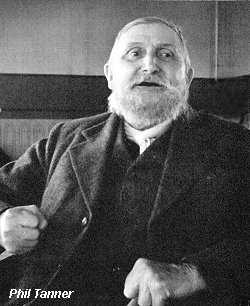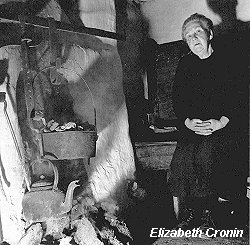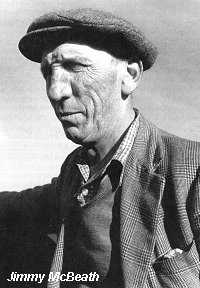| World Library of Folk and Primitive Music |
| Volume 1 - England |
|---|
| Rounder CD 1741 |
| World Library of Folk and Primitive Music |
| Volume 2 - Ireland |
| Rounder CD 1742 |
| World Library of Folk and Primitive Music |
| Volume 3 - Scotland |
| Rounder CD 1743 |
I will not include sound clips of the more well known performances from these records (although they may often be the best), as many readers will already be familiar with them, and particularly since many of the singers and musicians will also appear on the Topic Voice of the People series, where full length recordings allow for a better selection of an appropriate clip.
These three CDs form part of the Alan Lomax Collection which was so proudly launched last year with the release of the Series Sampler. From the information given in the Sampler's booklet and the mounds of publicity material accompanying the launch of the Series, we were led to believe that the new CDs would be new digital remasterings of the original tapes, that they would include lots of material which had never before been released and that new notes would be written to supplement the originals, taking into account the advances in musicology and ethnology of the past 40 years.
Now, I don't own copies of these three records as they appeared on the Columbia label in the mid-'50s, but from what I can gather, the contents seem to have gained little in the intervening four decades. Indeed, my copy of the English volume has lost something, since pages 3, 4, 32 and 33 of its booklet are blank! There is a new Introduction by Bob Copper (the beginning of which is missing), but the remaining part tells us nothing we've not seen many times before in Bob's writings, concerning itself primarily with the EFDSS, the Coppers and Alan Lomax. In fact, the booklets of the half dozen or so CDs in the Collection that I've seen so far seem to spend far more time discussing the merits of Mr Lomax than those of the music!
Turning to page 3 in the Scottish volume, I find an introductory piece on the 'Folk and Primitive Library', which again devotes most of its text to Lomax, but informs us that the original records were: " ... packed with examples, and individual recordings were frequently edited or faded. If complete performances were used on the CD re-issues many volumes would exceed the limits of even that format and the flow of the original programming would be lost. For these reasons the timing and original composition of the original albums has been kept." So there we have it: nothing new - or even complete - here.
Surely it would not have been beyond the wit of man to put complete versions on the CDs were there was room and reserve the editing for those where there wasn't? The "new material from the Lomax archives" promised on page 7 of the Sampler booklet has failed to materialise, despite there being approximately 30 minutes of free space on each of these CDs.
Nor do we fare much better in the booklets. The Scottish volume has a new introduction by Hamish Henderson and Margaret Bennett (which concerns itself mainly with Scottish national identity), yet retains the original 1955 introduction and song notes by Lomax, these latter having been revised by Henderson and Bennett in 1998. Similarly, the Irish volume has a new introduction (well, two actually) by Nicholas Carolan and Robin Roberts, plus Lomax's introduction and his notes with Seamus Ennis, revised by Carolan. As with the England volume, the new introductions tell us more about Lomax than anything else, and it is only Carolan and Roberts - an actress who seems to have been along for the ride - who give us some snippets of information about the performers.
The English have to make do with Bob Copper's introduction and the original, unrevised Lomax/Peter Kennedy introduction and song notes.  Many readers will thus be prepared for phrases like "the jolly and frolicksome[sic] traditions of the English countryside", the Padstow Teaser's "phallic club" and "real folk flavour". But nothing prepared me for this drivel about Phil Tanner: " ... his last days were spent in an old-age [sic] home, where the paupers yawned over his best ballads. Fortunately, this was recorded before his death [yes, truly] ... When Phil died, England [honest!] lost her best traditional singer." Did no one at Rounder actually read this stuff?
Many readers will thus be prepared for phrases like "the jolly and frolicksome[sic] traditions of the English countryside", the Padstow Teaser's "phallic club" and "real folk flavour". But nothing prepared me for this drivel about Phil Tanner: " ... his last days were spent in an old-age [sic] home, where the paupers yawned over his best ballads. Fortunately, this was recorded before his death [yes, truly] ... When Phil died, England [honest!] lost her best traditional singer." Did no one at Rounder actually read this stuff?
Furthermore, it's technically inaccurate too. A nice photo of Bill Westaway in included although I don't find him on the record. We're also told that "Verses in square brackets are omitted from this CD." What verses in square brackets? - there aren't any! The text has been cut as well as the performance, leaving the listener unaware of which songs are complete and which edited. And in several places they've got things completely mixed up, so that the text doesn't match what you hear at all! Might we not have been spared the pages and pages of praise songs to Lomax to leave space for the full texts of these songs which he is supposed to have thought so important?
Is the Lomax 'cult of personality' so strong at Rounder that nothing he did can be changed, or improved upon? Given that his two daughters are heading the project, this may very well be the case - but what is there to be so protective of here? Of the 30 tracks on the England volume only 5 were recorded by Lomax anyway. Fancy guessing which ones? Jack Armstrong, Isla Cameron and Ewan McColl! Of the remaining 25, at least 18 were recorded before he ever set foot in England or came up with his grand plan to "record the whole world of people's music" - some as early as 1937.
Well - there are those who hold that everything in sleevenotes and booklets is bollocks anyway and that one should ignore it all and just listen to the music. So let's do that - starting with Volume 1: England.
Almost a quarter of the tracks are by revivalists (McColl, Lloyd, Cameron, Kennedy) and I think we can safely ignore them in this review. That's the 'folk' taken care of - now, what about the 'primitives'? Track 1 is the Haul on the Bowlin' shanty, by Stanley Slade who died in 1950 and, according to the notes, was "perhaps the last of [England's] singing sailors". What might Stan Hugill, Bob Roberts, Sam Larner, Johnny Doughty (to name a very few) have had to say about that, I wonder? Mr Slade is joined by a chorus (a BBC chorus, further reading reveals) who have no concept of the rhythmic elements commonly considered an essential part of work songs. This unfortunate start is compounded by track 2, A' Roving, which we are told is a capstan shanty, and features not only our trusty chorus, but also an equally arhythmic piano accompaniment for Christ's sake! At this point I am almost frightened to try track 3.
But it's a quite unexceptionable minute or so of Royal Earsdon Sword Dancers, or at least the fiddle and feet thereof, followed by two verses from Isla Cameron. Then we get Jim and Bob Copper with some of The Contented Country Lad - a particularly low-key performance. Next is Fred Perrier with The Termut Hoer's Song which, we are told is the "county song of Wiltshire" - Oh, really?
I can't go on - let's just mention the good things. Phil Tanner's Wassail Song, Sweet Primroses ![]() and Gower Reel are wonderful, of course; as is Walter Lucas' Prickle Holly Bush (sound clip). Aunt Fanny Rumble (Richard of Taunton Dean),
and Gower Reel are wonderful, of course; as is Walter Lucas' Prickle Holly Bush (sound clip). Aunt Fanny Rumble (Richard of Taunton Dean), ![]() Jumbo Brightwell (False Hearted Knight), 'Charger' Salmons (Rigs of the Time) (sound clip) and Jim Copper (Thrashing Machine) are all excellent too. But none of these (I think) are heard in their entirety. I really cannot recommend this CD to MT readers on the basis of eight or ten interesting yet incomplete performances.
Jumbo Brightwell (False Hearted Knight), 'Charger' Salmons (Rigs of the Time) (sound clip) and Jim Copper (Thrashing Machine) are all excellent too. But none of these (I think) are heard in their entirety. I really cannot recommend this CD to MT readers on the basis of eight or ten interesting yet incomplete performances.
Hoping for something better, let's turn to Volume 2: Ireland. And much better it is too! Few revivalists here, as far as I can gauge - but Seamus Ennis seems very over-represented with 9 of the 34 tracks (5 songs, 3 uilleann pipes, 1 tin whistle). Given the quality of some of the other performers featured here, it does seem an unreasonable proportion, even if he was Lomax's principal informant and assistant. He is a wonderful piper, but not, in my opinion, a 'great' singer.
The booklet is also much better, though it still tells us less about the performers and their music than I find acceptable, and still has some similar inaccuracies to the English one - including, again, a fine photo of a fiddle player, Johnny Hoare, who doesn't appear on the record.
My knowledge of Irish song is hardly extensive,  but I am pretty sure that almost all those to be found here are cut-down versions -
but I am pretty sure that almost all those to be found here are cut-down versions - ![]() which is a crying shame, since there are some real gems from some very fine singers. Elizabeth Cronin, Mickey Cronin (sound clip), Citi Ni Ghallchóir, Maigi Ni Dhonnachadha, Colm Ó Caoidheán, Margaret Barry, Máire Ni Cheocháin, Seán 'ac Dhonnchadha, Máire Seoighe, Cáit Ni Mhuimhneacháin and Gobnait Ni Chróinin get two or three songs each and are all in great form throughout. Máire Ni Shúilleabháin is given four songs, which she sings well, but sounds as if she's learned them rather than grown up with them, and Seamus Ennis's song performances are all pretty selfconscious and didactic.
which is a crying shame, since there are some real gems from some very fine singers. Elizabeth Cronin, Mickey Cronin (sound clip), Citi Ni Ghallchóir, Maigi Ni Dhonnachadha, Colm Ó Caoidheán, Margaret Barry, Máire Ni Cheocháin, Seán 'ac Dhonnchadha, Máire Seoighe, Cáit Ni Mhuimhneacháin and Gobnait Ni Chróinin get two or three songs each and are all in great form throughout. Máire Ni Shúilleabháin is given four songs, which she sings well, but sounds as if she's learned them rather than grown up with them, and Seamus Ennis's song performances are all pretty selfconscious and didactic.
![]() The music is quite as good as the singing: Seán Moriarty (fiddle) (sound clip - The Brown Thorn), the Ballinakill Ceilidhe Band, Mickey Doherty (fiddle) and, of course, Seamus Ennis all play splendidly. I think Ennis's Bucks of Oranmore and Where you at the Rock are my favourites.
The music is quite as good as the singing: Seán Moriarty (fiddle) (sound clip - The Brown Thorn), the Ballinakill Ceilidhe Band, Mickey Doherty (fiddle) and, of course, Seamus Ennis all play splendidly. I think Ennis's Bucks of Oranmore and Where you at the Rock are my favourites.
The Irish volume is just so much better than the English one, in almost every respect - but is still utterly marred by the incomplete performances. It might be fine to put on as background music, when you're not really listening - but many of these performances just compel you to pay attention.
Turning to the Scots volume, who should we find but the roving Isla Cameron and Ewan McColl? "Ye a' turn tae Scotsmen, as soon's ye get here" keeps coming to mind. What's more, the start of the CD is even less auspicious than that of the English one - after the inevitable pipe and drum marches from the Glasgow Police Band, we get, in quick succession, three songs from McColl and one from Cameron, a group of four childrens' songs and concert-style My Love is Like a Red, Red Rose from a Mrs McGrath and her friends and neighbours at an evening of Burns poetry. Despite my having some Scots blood, this doesn't appeal to me at all.
We have to wait 'til track 9 before we encounter anything likely to be of much interest to MT readers: a snatch of the Bressay Lullabye sung by Elizabeth Barclay, followed by The Hen's March to the Midden by the lovely Willie Johnson and Tom Anderson (fiddle and guitar). 
![]() More good stuff follows, with John Strachan's Bonnie Lass o' Fyvie, Tinkers' Waddin' and what may be the complete version of Glenlogie (sound clip) - though only two verses appear in the booklet! Jimmy McBeath sings MacPherson's Rant and Tramps and Hawkers better than I've ever heard him do it. Jimmy Shand contributes a sparkling De'il Amang the Tailors. That covers the first half of the CD (presumably the first side of the LP), dedicated to the music of the Scottish Lowlands.
More good stuff follows, with John Strachan's Bonnie Lass o' Fyvie, Tinkers' Waddin' and what may be the complete version of Glenlogie (sound clip) - though only two verses appear in the booklet! Jimmy McBeath sings MacPherson's Rant and Tramps and Hawkers better than I've ever heard him do it. Jimmy Shand contributes a sparkling De'il Amang the Tailors. That covers the first half of the CD (presumably the first side of the LP), dedicated to the music of the Scottish Lowlands.
The second half deals with the Highlands, or so it says - but the only tracks where any locality is given are all placed on the Islands, notably Barra, South Uist, Benbecula and Skye. Unfortunately, all we are told for some tracks is "Sung by Mrs Rena MacLean and group" or something similarly illuminating, so I can't say whether any of them are from the mainland. ![]() There are 24 songs (or parts of songs) here, all in Scots Gallic (or is it Celtic?) - and all of them, and their singers (the majority of whom are women), are absolutely wonderful! There's a very varied selection too - waulking songs (like this sound clip of a group of Lewis women singing Héman dubh hi ro oro while at work),
There are 24 songs (or parts of songs) here, all in Scots Gallic (or is it Celtic?) - and all of them, and their singers (the majority of whom are women), are absolutely wonderful! There's a very varied selection too - waulking songs (like this sound clip of a group of Lewis women singing Héman dubh hi ro oro while at work), ![]() spinning, weaving, milking and boating songs and of course the famous Port á beul (sic) sung dance music (sound clip - Làrach do thacaidean - Kitty MacLeod). I'm sorry that so much of this music is new to me - and I'll certainly try to hear more of it in the future - because I can't write the detailed review it deserves. What I can say is that this section of the CD more than makes up for the decidedly dodgy first eight tracks.
spinning, weaving, milking and boating songs and of course the famous Port á beul (sic) sung dance music (sound clip - Làrach do thacaidean - Kitty MacLeod). I'm sorry that so much of this music is new to me - and I'll certainly try to hear more of it in the future - because I can't write the detailed review it deserves. What I can say is that this section of the CD more than makes up for the decidedly dodgy first eight tracks.
If there's any Scottish reader who understands this music and would like to write a review of it for us, I'd be very pleased to include it within this piece. Any offers?
To sum up - all three of these CDs suffer from having almost all their tracks shortened to some extent, unforgivable given the half hour of blank space on each disc. Rounder do promise that some of the tracks will appear in full on subsequent issues - but that does raise the question of why anyone should shell out for these! In all cases, the booklet notes are not as carefully prepared as they should have been, and in the case of the English volume they are a disgrace. There are also a few small technical problems with the discs themselves, the most annoying of which is that the gap between a few tracks is so short that it appears that the singer has changed key and tune between verses, rather than that a new song has begun.
If you can stand the fact that you'll be buying incomplete versions of almost everything, I'd recommend the Ireland and Scotland volumes. Forget the England one and hope that the Folksongs of England,Scotland and Ireland series will provide something more worthy of all the hype which has surrounded the launch of the Alan Lomax Collection.
Rod Stradling - 24.10.98
| Top of page | Home Page | Articles | Reviews | News | Editorial | Map |